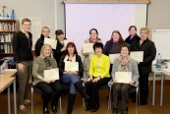
Asthma Education Programme in Disadvantaged communities
By Aisling Doherty, Health Promotion Officer with the Asthma Society of Ireland and Course Facilitator for the Asthma Education Programme in Disadvantaged Communities
In 2013 the Asthma Society of Ireland developed and piloted an asthma education programme for disadvantaged communities. An external evaluation carried out by Trinity College, Dublin on the pilot programme strongly recommended the wider implementation of the project. The programme has been shown to be an effective and relatively low cost means to building capacity around asthma health promotion in the disadvantaged communities.
The programme is a fifteen hour interactive workshop delivered over five sessions. The programme aims to equip participants with information on asthma/asthma management, triggers, asthma attack treatment and upskill participants on inhaler technique. Participants receive a resource pack which contains a range of devices and educational materials including a specially designed literacy friendly DVD, leaflet and poster.
The training empowers participants to disseminate key learnings about asthma management and inhaler technique to members of their community through information evenings, asthma awareness events and/or on a one-to-one basis during health visits. The feedback to the programme has been particularly positive from participants and coordinators of the communities. There has been a reported improvement in individuals own self-management of asthma which has encouraged the further dissemination of messages to those in need within their own community.
Some of the feedback from participants shows the difference the programme makes, which is really encouraging for me as facilitator and also for the Society. It’s great to hear from the people we are working with, and to hear their opinion on the impact of our work:
“I didn’t know how serious asthma is and how important it is to take inhalers. I have family members that have asthma and I know now more about it in order to help them”. (Participant from West of Ireland)
“This training is very much needed training in our Travelling community, as I find most don’t know how to use the inhalers and are not explained by their GP or they don’t understand the medical jargon” (Participant from South East Ireland)
I find this programme an excellent educational training for disadvantaged communities who would not be previously has engaged with asthma management training. There is a large focus in the training on inhaler technique which I find the participants engage the most with as it gives them a chance to get a more hands on practical element and increase their ownership and value within the programme. Upskilling the healthcare worker in correct inhaler technique to inform members of their own within the communities is imperative.
Asthma Education in Disadvantaged communities is a very rewarding project to be a part of, as I find the majority of participants in the training have asthma themselves or a child/spouse with asthma. The difference in their own reported asthma symptoms from week one to week five is remarkable. The majority of participants report being able to finally feel medication working as prescribed or feeling confidence to go back to their health care provider to avail of a different type of inhaler device more suited to their needs. This I believe to be the most important element of the training, being able to empower these individuals to seek information/advice and ask the questions of their healthcare provider if they are not happy with their treatment.
This year I will revisit last year’s participants and provide refresher training for them. This is part of our commitment for continued support to the healthcare workers to ensure up to date practice and information is being passed on to their communities.
On the 1st of December the ASI certified sixteen further community members taking the total number of participants certified to ninety six in 2015 with an expected 100 more people to be certified in 2016.
If you would like to find out more or to receive a copy of the evaluation report, please contact This email address is being protected from spambots. You need JavaScript enabled to view it..
{jcomments on}